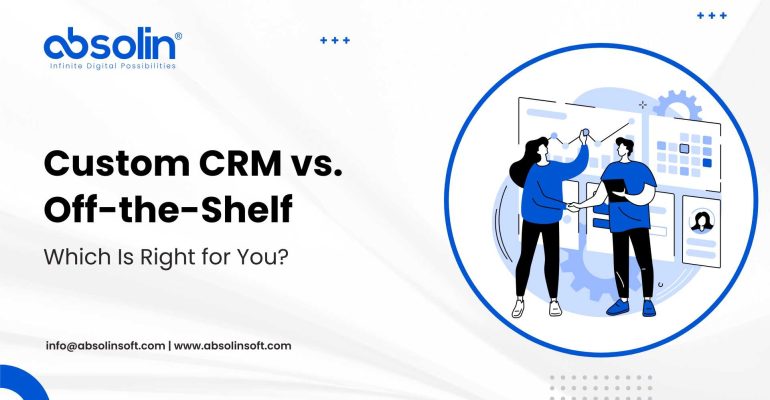Custom CRM vs. Off-the-Shelf: Which Is Right for You?
In today’s business world, building and maintaining strong customer relationships is non-negotiable. A Customer Relationship Management (CRM) system helps companies do exactly that by organizing, automating, and synchronizing every customer touchpoint, from sales and marketing to service and support.
But as businesses grow and diversify, one crucial question emerges:
Should you go for a custom-built CRM or choose an off-the-shelf solution?
This decision isn’t just technical – it’s strategic. The CRM you choose can shape how efficiently your team works, how well you understand your customers, and how fast you scale. In this blog, we’ll dive deep into the pros and cons of custom CRM vs. off-the-shelf solutions, and help you figure out which one is the right fit for your business.
What Is an Off-the-Shelf CRM?
An off-the-shelf CRM is a pre-built, ready-to-use software solution designed to cater to the general needs of most businesses. Popular examples include:
- Absolin CRM
- Salesforce
- HubSpot
- Zoho CRM
- Microsoft Dynamics 365
- Pipedrive
These platforms typically offer core CRM features such as contact management, sales pipeline tracking, email automation, analytics, and integrations with other tools.
What Is a Custom CRM?
A custom CRM is a tailor-made solution developed specifically for your business. It’s built from the ground up or on top of an existing framework to match your unique processes, workflows, and objectives. Custom CRMs are typically developed in-house or outsourced to a software development partner.
Off-the-Shelf CRM: Pros and Cons
✅ Pros
1. Faster Implementation
Off-the-shelf CRMs are plug-and-play. You can get started within days or even hours.
2. Lower Upfront Costs
These platforms usually follow a subscription-based model, which means minimal initial investment.
3. Regular Updates & Support
Vendors provide frequent updates, bug fixes, and security patches. You also get access to customer support and user communities.
4. Proven & Trusted
These solutions are tried and tested by thousands of businesses. They come with reliability, scalability, and a huge ecosystem of third-party tools.
5. Rich Feature Sets
You get access to a comprehensive suite of features like email marketing, automation workflows, dashboards, and integrations all out of the box.
❌ Cons
1. Limited Customization
While some off-the-shelf CRMs offer flexibility, you’re ultimately limited by what the platform allows. Tailoring it to your niche workflows can be challenging or impossible.
2. Feature Overload
You may end up paying for features you don’t need, and the platform can become unnecessarily complex.
3. Integration Challenges
Integrating an off-the-shelf CRM with legacy systems or niche tools might require workarounds, middleware, or third-party connectors.
4. Ongoing Subscription Costs
Over time, recurring license fees can add up, especially if you scale your team.
Custom CRM: Pros and Cons
✅ Pros
1. Tailored to Your Business
Every feature is designed around your specific needs. Whether you’re in healthcare, real estate, manufacturing, or a startup with a unique model, a custom CRM can align perfectly with your operations.
2. Scalable and Flexible
As your business evolves, your CRM evolves with it. You can add new features, refine workflows, and tweak user interfaces without vendor restrictions.
3. Ownership and Control
You own the platform, codebase, and data architecture. No third-party dependencies or vendor lock-ins.
4. Streamlined User Experience
No unnecessary features. Just the tools your team needs to get the job done efficiently, leading to higher adoption rates.
5. Competitive Advantage
A custom CRM can give you capabilities your competitors don’t have, giving you an edge in customer insights and automation.
❌ Cons
1. Higher Initial Cost
Custom development requires a significant upfront investment, including planning, design, development, testing, and deployment.
2. Longer Time to Launch
Building a system from scratch takes time, often weeks or months, depending on complexity.
3. Ongoing Maintenance
You’re responsible for updates, bug fixes, security, and infrastructure unless you hire a managed services provider.
4. Development Risk
There’s a risk of budget overruns, scope, or quality issues, especially without clear goals or an experienced development team.
Key Factors to Consider
When deciding between custom and off-the-shelf CRM, consider the following:
✅ Business Size and Complexity
- Small or Medium Business (SMB): Off-the-shelf CRMs often offer everything you need, especially if your processes are standard.
- Large or Niche Business: A custom CRM may be ideal if your business has complex workflows or highly specialized needs.
✅ Budget
- Need to get started quickly and affordably? Go off-the-shelf.
- Have the budget to invest in a long-term solution tailored to you? Custom is a solid choice.
✅ Timeframe
- Short timeline? Choose an off-the-shelf solution.
- Long-term strategy? A custom CRM could be worth the wait.
✅ Integration Needs
If you rely on proprietary systems or have custom tools in your stack, a custom CRM may integrate more seamlessly.
✅ Control and Compliance
Heavily regulated industries (e.g., healthcare, finance) might benefit from the data control and security customization of a bespoke solution.
Conclusion: Which Is Right for You?
Choosing between a custom CRM and an off-the-shelf solution is more than a software decision; it’s a reflection of your business’s current maturity, strategic goals, and vision for the future. While off-the-shelf CRMs offer speed, affordability, and a wealth of features right out of the box, they may fall short when it comes to flexibility and unique business needs. On the other hand, a custom CRM acts like a tailor-made suit built precisely for your operations, scalable on your terms, and aligned with your long-term ambitions.
Your CRM is the digital heartbeat of your customer relationships. Whether you choose a ready-made solution or build your own from scratch, the end goal should be the same: to foster deeper customer connections, enhance team productivity, and support sustainable growth.
Evaluate your needs honestly, weigh the trade-offs carefully, and remember – the best CRM is the one that empowers your team, delights your customers, and evolves with your business.



